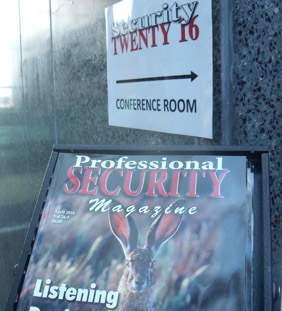How do you manage a security or other emergency, if it’s out of hours and senior managers are not on the spot? This was among the questions raised in a talk on leadership at the Security TWENTY 16 North conference in Manchester on July 5.
The speaker was Alan Cain, head of security and business continuity at Manchester Metropolitan University (MMU). His talk combined leadership with organisational resilience and emergency management. Resilience he began by defining according to the British Standard BS56000 as the ‘ability of an organisation to respond and adapt to change’. Or as the football manager Ian Dowie put it, ‘bounce-back-ability’. For more, see the August 2016 print issue of Professional Security magazine.
Another speaker with a local link was Tony Porter, the former Greater Manchester Police man now the Surveillance Camera Commissioner. A return speaker to the ST series of events, he gave an update on his office’s work on standards for good public space surveillance. He spelt out his position: “I am anti bad surveillance, I really am, but pro-good surveillance.” His office has refreshed the CCTV operational requirement, as written by the Home Office’s scientific arm CAST in the 2000s, as a ‘passport to compliance’ with the surveillance camera code of practice, for manufacturers and installers, besides the users of CCTV. Pilot testing of the operational requirement is going on over the next few weeks. Also coming from the regulator is a strategy document, again for all who are to do with CCTV, whether makers of products, the installers, trainers, and the Crown Prosecution Service.
Earlier after a welcome by Professional Security MD Roy Cooper and the conference chairman, the consultant and past IPSA chairman Mike White, Paul Smith of the Metropolitan Police opened the conference by playing a news item by the Australian Channel 9 TV news show 60 Minutes, which described the super-recognisers, the Met’s officers and staff found to have an uncanny ability to remember faces and to put a name to them – a gift thought to be strong in one or two per cent of the population. That’s been put to use to identify suspects from CCTV images, and to pin more crimes on known offenders, so as to make possible heavier court punishments than if only a single crime was linked to the offender. Dr Josh Davis of the University of Greenwich at ST14 Autumn at Heathrow in October 2014 talked about his study of the Met’s super-recognisers; Paul Smith provided an update to Manchester; about the unit set up as a trial of super-recognisers at Scotland Yard in 2015. In May 2016 for example some 42 per cent of ‘idents’ (identification) of suspects wanted from CCTV were by the super-recognisers, whether part of the unit or elsewhere in the force.
The former Cheshire Police man now a trainer, Dave Spreadborough, urged the conference audience to ‘think forensically’. His slogan was that ‘we are all on the same side … we need to play the same game’. His point; that video, if displayed incorrectly, can change your interpretation of a scene; the actual clothing of a suspect, for example, may be different from what you see in a CCTV still.
Simon Gordon, the founder of the online reporting service Facewatch, took the event through the Facewatch app, the newly-launched (with contractor Mitie, whose Paul French was in the audience) MitieSafewatch product, the Forecourt Eye service for reporting of drivers who claim they cannot pay because they have ‘no means to pay’, and facial recognition.
Updates on products came from Southwest Microwave, Seagate Technology, Hanwha Techwin, and Axis Communications.
The next ST16 event is in London, at the Park Inn Heathrow on Wednesday, November 2. To register to attend for free, email organiser Liz Lloyd [email protected].










